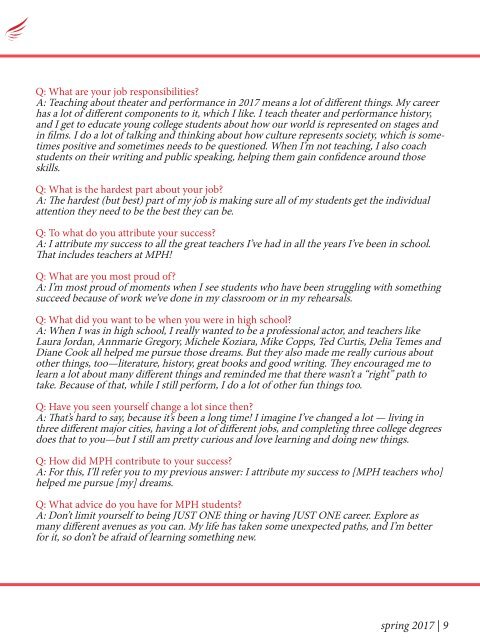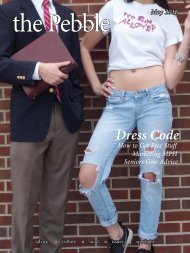the Pebble Spring 2017
You also want an ePaper? Increase the reach of your titles
YUMPU automatically turns print PDFs into web optimized ePapers that Google loves.
Q: What are your job responsibilities?<br />
A: Teaching about <strong>the</strong>ater and performance in <strong>2017</strong> means a lot of different things. My career<br />
has a lot of different components to it, which I like. I teach <strong>the</strong>ater and performance history,<br />
and I get to educate young college students about how our world is represented on stages and<br />
in films. I do a lot of talking and thinking about how culture represents society, which is sometimes<br />
positive and sometimes needs to be questioned. When I’m not teaching, I also coach<br />
students on <strong>the</strong>ir writing and public speaking, helping <strong>the</strong>m gain confidence around those<br />
skills.<br />
Q: What is <strong>the</strong> hardest part about your job?<br />
A: The hardest (but best) part of my job is making sure all of my students get <strong>the</strong> individual<br />
attention <strong>the</strong>y need to be <strong>the</strong> best <strong>the</strong>y can be.<br />
Q: To what do you attribute your success?<br />
A: I attribute my success to all <strong>the</strong> great teachers I’ve had in all <strong>the</strong> years I’ve been in school.<br />
That includes teachers at MPH!<br />
Q: What are you most proud of?<br />
A: I’m most proud of moments when I see students who have been struggling with something<br />
succeed because of work we’ve done in my classroom or in my rehearsals.<br />
Q: What did you want to be when you were in high school?<br />
A: When I was in high school, I really wanted to be a professional actor, and teachers like<br />
Laura Jordan, Annmarie Gregory, Michele Koziara, Mike Copps, Ted Curtis, Delia Temes and<br />
Diane Cook all helped me pursue those dreams. But <strong>the</strong>y also made me really curious about<br />
o<strong>the</strong>r things, too—literature, history, great books and good writing. They encouraged me to<br />
learn a lot about many different things and reminded me that <strong>the</strong>re wasn’t a “right” path to<br />
take. Because of that, while I still perform, I do a lot of o<strong>the</strong>r fun things too.<br />
Q: Have you seen yourself change a lot since <strong>the</strong>n?<br />
A: That’s hard to say, because it’s been a long time! I imagine I’ve changed a lot — living in<br />
three different major cities, having a lot of different jobs, and completing three college degrees<br />
does that to you—but I still am pretty curious and love learning and doing new things.<br />
Q: How did MPH contribute to your success?<br />
A: For this, I’ll refer you to my previous answer: I attribute my success to [MPH teachers who]<br />
helped me pursue [my] dreams.<br />
Q: What advice do you have for MPH students?<br />
A: Don’t limit yourself to being JUST ONE thing or having JUST ONE career. Explore as<br />
many different avenues as you can. My life has taken some unexpected paths, and I’m better<br />
for it, so don’t be afraid of learning something new.<br />
spring <strong>2017</strong> | 9



